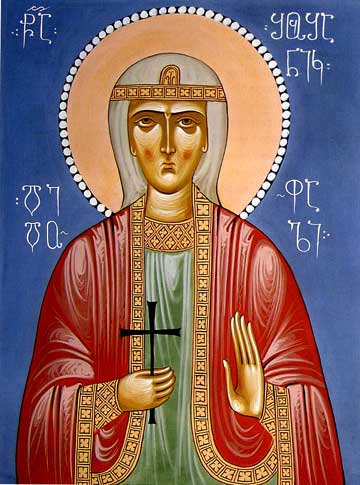The GreatMartyress Shushanika, Princess of Rana
Commemorated on August 28
The GreatMartyress
Shushanika, Princess of Rana (+ 475), was the daughter of the reknown
Armenian military-commander Vardanes. Her actual name – was Vardandukht, but
the name she was fond of using – was Shushanika. From her childhood years
Saint Shushanika distinguished herself by her fear of God and her piety.
She entered into
marriage with the pitiakhshah (governor of outlying districts of Gruzia) named
Varxenes, who renounced Christ and became an apostate to the faith. In the
eighth year of the rule of the shah Peroz, Varxenes set off to Kteziphon,
whereat was the residence of the Persian shah, and he became a Mazdaeite
(fire-worshipper), so as to please the shah. Having learned about this upon the
return of her husband, Saint Shushanika did not want to continue married life
with an apostate from God. She left the palace and began to live in a small
cell, not far off from the palace church. The priest of the empress, named
Yakov-James Tsurtaveli (afterwards the author of her vita), relates that the
holy empress, learning of her husband's intent to resort to force, was filled
with determination to stand firmly in the faith, despite any sort of
entreaties, threats or tortures. Rejecting the offers of Varxenes, on 8 January
469 she was subjected to a beating by him and thrown into chains, and on 14
April 469 she was locked up in a prison fortress, where she remained for six
and an half years. "Six years she spent imprisoned and yet adorned with
virtues: by fasting, by vigilance, standing on her feet, with unflagging
prostrations and the incessant reading of books. She was wrought into a
spiritual flute, sanctified and embellished by prison". To the prison came
many of the afflicted, "and each, through the prayers of Blessed
Shushanika, received from God the Lover-of-Mankind that in which they were in
need of: the childless – children, the sick – health, the blind –
sight". By this time Varxenes had converted to fire-worship the children
of Saint Shushanika, and they ceased to visit their imprisoned mother. In the
seventh year of the imprisonment of Saint Shushanika sores began to appear on
her legs and body. Jodjik, the brother of the pitiakhshah Varxenes, having learned
that Blessed Shushanika was close to death, managed to get into the prison with
his wife and children and he besought of Saint Shushanika: "Forgive us our
guilt and bless us". Saint Shushanika forgave them and blessed them,
saying: "All the present life is transient and inconstant, like a flower
of the fields; one plants it, and another is pleased, one squanders it on
trivia while another doth gather, one uses it for oneself, but another doth
find...".
On the eve of the
blessed death of the holy martyress, she was visited in prison by the Gruzia
Katholikos-Archbishop Samuel I (474-502), by Bishop John and by the priest of
the martyress Yakov-James Tsurtaveli (over the course of all six years he had
constantly visited and consoled her). The court bishop Athots (Photios)
communed Saint Shushanika. Her last words were: "Blest be the Lord my God,
wherefore with peace I do repose and sleep". The end of the blessed
martyress ensued on 17 October, on the feastday of the Unmercenary Martyrs
Cosmas and Damian, and it was particularly on this day that the ancient Church
celebrated her memory.
The relics of the
holy Martyress Shushanika rested at first in a church in the city of Tsortag.
The Tsortag church after a certain while fell under the lead of an Armenian bishop
– a Monophysite, and the Katholikos-Archbishop of Gruzia Samuel IV (582-591)
transferred the holy relics of Saint Shushanika to the city of Tbilisi, where
in the year 586 they were put into a chapel of the Metekh church, on the south
side of the altar. And indeed, it is in connection with this event that the
memory of Saint Shushanika was transferred from 17 October to 28 August.
© 1996-2001 by translator Fr. S. Janos.
